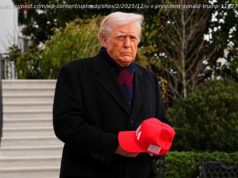Attorney General Jeff Sessions is unlikely to go anywhere soon, despite President Donald Trump’s public and private dressing-downs.
Even in the face of Trump’s ire, Sessions has proved to be a key Cabinet member in effectuating Trump’s policy priorities. He has steadily rolled back a bevy of Obama-era initiatives on criminal justice issues, immigration, marijuana and transgender rights, while simultaneously defending all of Trump’s controversial executive orders (and tweets) in federal court. Sessions has also continually given Trump credit — by name — for the initiatives he pursues.
Another factor ensuring Sessions‘ spot atop the Justice Department: any confirmation battle for a new attorney general would be a protracted and deeply partisan fight.
The nominee would come before the Senate Judiciary Committee, headed by Chuck Grassley — who defended Sessions previously — but recently erupted in anger when the attorney general came out against a renewed effort for criminal justice reform championed by the Iowa Republican.
Justice Department leaders from previous administrations also continue to have Sessions‘ back. Edwin Meese III, who served as President Ronald Reagan’s attorney general, penned a USA Today op-ed titled „Jeff Sessions is the most underrated member of the Trump administration.“
Such works have been amplified via conservative public relations firms‘ email blasts, helping to reinforce Sessions among party faithful. When Trump’s rage at Sessions reached a boiling point last summer, Breitbart posted a counterassault, emphasizing how „losing Sessions could endanger the administration and the split the critical coalition that helped Trump to the presidency.“
While in the past Sessions has said that Trump’s criticisms were „kind of hurtful,“ he has also made no apologies for the recusal decision, maintaining — despite entreaties from White House officials –that it was made in consultation with career ethics officials at the Justice Department and in the works from the time he was sworn in.
„I believe I did the right thing — the only thing I could do,“ Sessions told Fox News‘ Maria Bartiromo in an interview on Sunday. „I participated in this campaign, and as such under explicit regulations of the Department of Justice, no one can participate in the investigation of a campaign in which they were an active participant.“
Trump continues to fume
That belief does not extend to the President, however, who has continually fumed in private about Sessions‘ decision.
Trump challenged Sessions on Wednesday to launch an investigation into the Obama administration for failing to do enough to stop the 2016 election foreign interference.
„Question: If all of the Russian meddling took place during the Obama Administration, right up to January 20th, why aren’t they the subject of the investigation?“ Trump tweeted. „Why didn’t Obama do something about the meddling? Why aren’t Dem crimes under investigation? Ask Jeff Session!“
The tweet came as no surprise to people close to Trump, who told CNN that the President’s rage towards Sessions has never gone away, festering under the surface for the last few months as other issues redirected his ire.
But with the flurry of headlines surrounding the special counsel in recent days — including Friday’s indictments of 13 Russian nationals and three Russian entities for their alleged scheme to meddle in the 2016 election — Trump’s anger towards Sessions reemerged. And the two men barely acknowledged each other when they were in the Oval Office together Tuesday afternoon for an event honoring law enforcement officials.
The fact that Deputy Attorney General Rod Rosenstein, the man who stepped in for Sessions when he recused himself, was tapped with announce Friday’s indictments further fired up Trump. One person close to the President said the mere image reignited Trump’s anger at Sessions.
„He will never get over Sessions recusing himself,“ the source said, adding that Trump’s anger toward the attorney general has led him to believe that Sessions is in over his head at the Justice Department.
Sessions was the first senator to endorse Trump, giving the presidential candidate a vote of confidence from the Republican establishment. During the 2016 campaign, Sessions called Trump „a leader who will bring change,“ and shortly after winning in November, Trump announced Sessions would be his attorney general.
Irreparably damaged
But that relationship was irreparably damaged in March 2017 when Sessions recused himself.
A month later, Trump slammed his Justice Department for offering a „watered-down“ version of his travel ban. In a July 2017 interview with The New York Times, Trump said he would never have named Sessions to the top law enforcement post if he had known he was going to recuse himself.
„Sessions should have never recused himself, and if he was going to recuse himself, he should have told me before he took the job and I would have picked somebody else,“ Trump said.
Then came the tweets.
He pestered Sessions for not looking into Hillary Clinton’s deleted emails, slammed him for being „very weak“ on Clinton’s „crimes“ and labeled him „beleaguered“ in July.
The pressure on Sessions was so great during the first six months of the Trump administration that the President asked for his resignation, calling the attorney general an „idiot,“ but then later declined to accept Sessions‘ resignation letter.
A source familiar with the blow up told CNN that then-chief of staff Reince Priebus was forced to run out of the West Wing to „tap“ on the window of Sessions‘ idling car before imploring him not to resign.
Trump’s anger boiled over in June, too, when the President pushed Priebus to obtain Sessions‘ resignation, according sources familiar with the exchange. Priebus later said that he talked Trump out of the firing.
Even as Trump has fumed over Sessions, he has leaned on him to do more for the administration.






